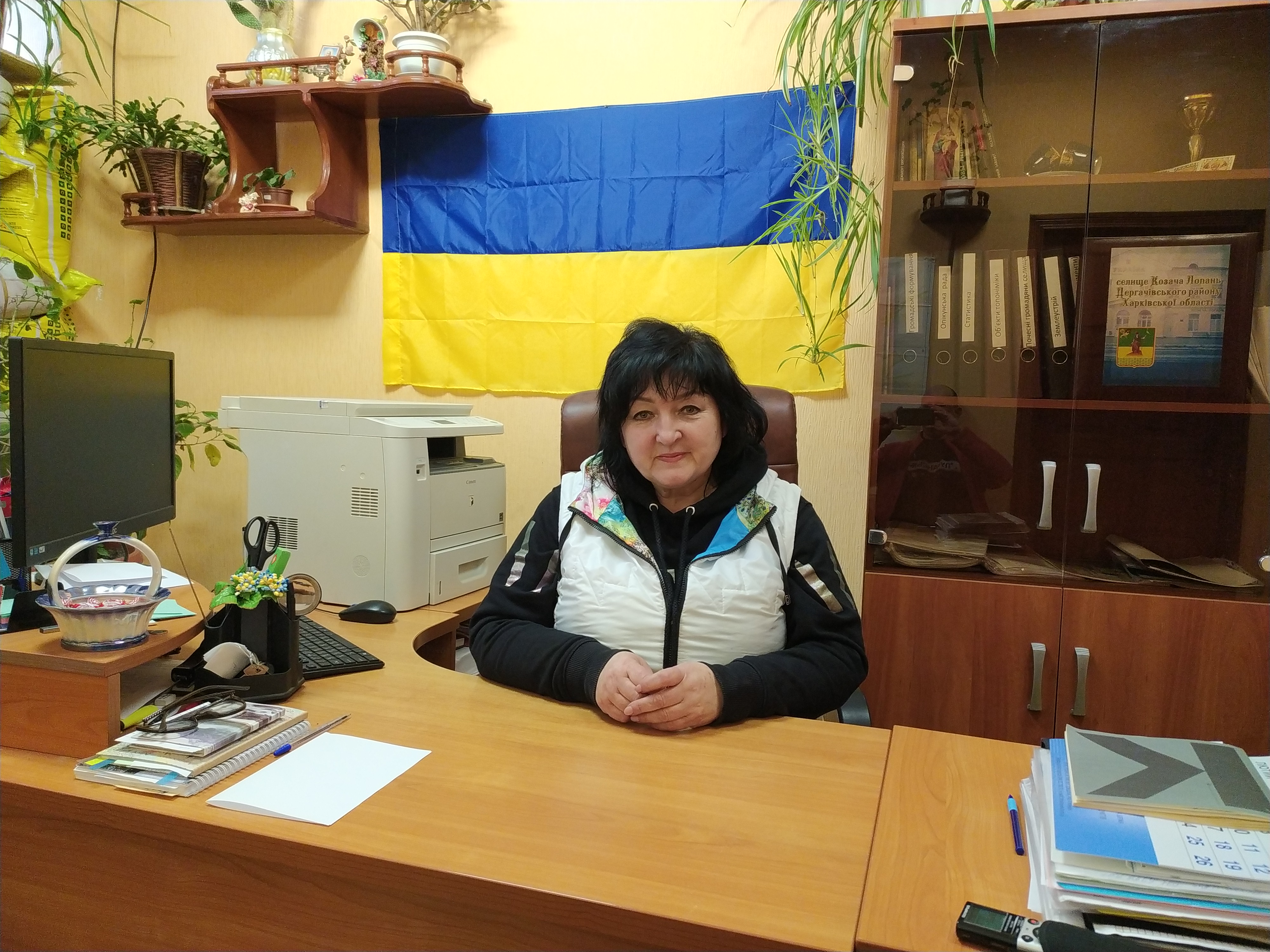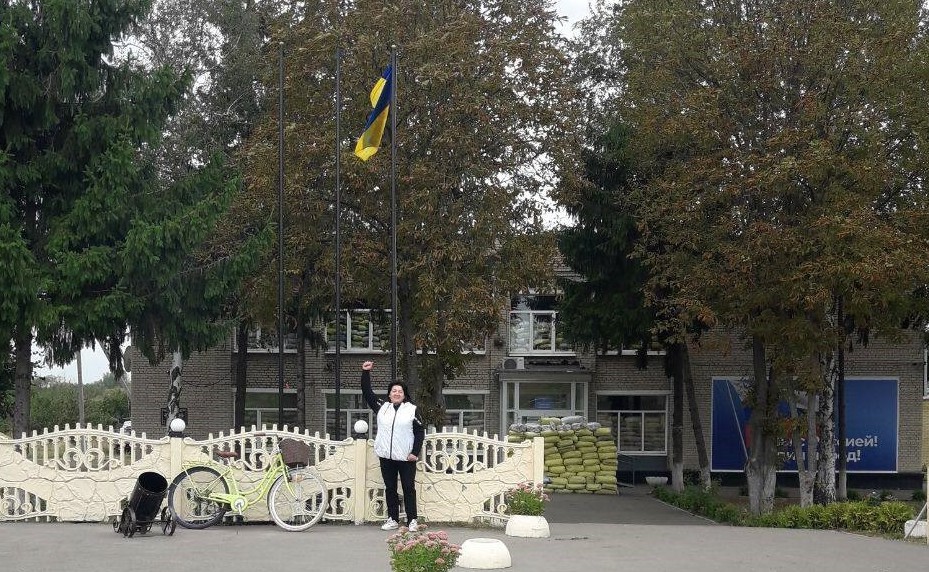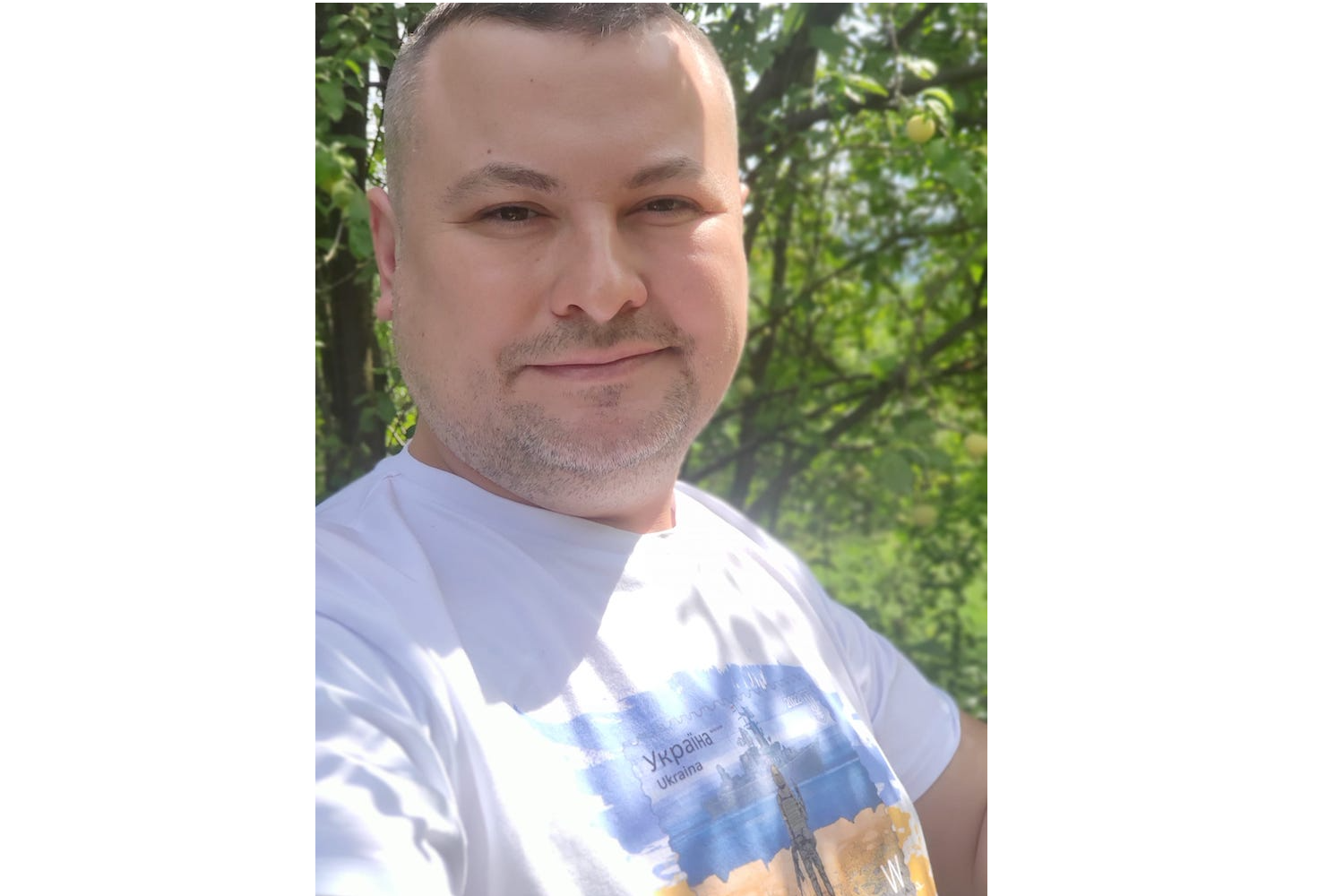The village of Cossack Lopan is an hour's drive north from Kharkov. Three kilometers from it to the border with the Russian Federation. Until February 24, 2022, almost 6,000 people lived here, now there are 1,800 left. To get here, you need a pass, which the military checks at several checkpoints. The road is almost empty – only occasionally roll old Soviet cars and dusty military off-road vehicles rush by. Here and there in the villages there are ruined houses, gates cut by shrapnel, windows covered with film. Even the asphalt reminds of the war – because of the traces of caterpillars in the cabin, there is a rumble, like in an airplane.
The Insider meets with the headman of the Cossack Lopan Lyudmila Vakulenko. Last spring, when the village was occupied, she was accused of treason. In March 2023, the court dropped the charges.
“On February 24, we woke up from volleys. The window is dark – and fireballs. And flies, and flies past us, across Kharkov. I – in the car and here, in the council. The roads are already clogged, people are going to Kharkov. Everything is quiet here, we do not understand anything. And two hours later the tanks went, ”recalls Lyudmila Vakulenko.
Cossack Lopan. Under the Ukrainian flag in occupation
The headman's office has artificial lighting, a high window blocked with sandbags – there are still shellings. Lyudmila Mikhailovna did not visit here from March until September 2022 – all the time while the Russian flag hung on the building. Surprisingly, the village council worked under the Ukrainian flag for a whole month of occupation. Power lines were cut, there was no gas, shops were closed. Under the administration, they did something like a humanitarian hub. Bread, cereals, flour, medicines were transported from the regional center across the front line. The Russian military only let cars through – you can't bring much. Behind the administration, porridge was cooked on a fire in a large cauldron and distributed to people.

Early in the morning on March 13, the military came to take Lyudmila home. We speak Ukrainian (they don't speak Russian in Cossack Lopan). Retelling the dialogues, the headman cites the replicas of the military in Russian. At the railway station where the military was located, a man in uniform came out to Lyudmila Vakulenko, introduced himself with the call sign "Ram". He asked why people gather near the council. “We cook food, we feed people,” Lyudmila answered.
“Why are there so few humanitarian aids?”
So you don't let our cars through. Only cars.
“They won't come through here again.
A couple of days later, KamAZ trucks with a humanitarian aid from the Russian Federation, military men, people in civilian clothes, and police from the LPR group appeared on the square in front of the village administration. At night, the Ukrainian flag was removed from the administrative building, in the morning the headman hung out a new one instead. And the flag of Ukraine was removed from the flagpole near the square just before the arrival of the column.
The headman was ordered to go out and "explain to your people what your power of people has brought to." She refused to leave until the Ukrainian flag was returned to the flagpole. And he was returned – in the video of the propaganda channel "Russia 1" there are three flags: the village of Cossack Lopan (it is crimson, this is the color of the Zaporozhye army), Russian in the center and Ukrainian.
“From the back door of the administration, we handed out small bags of food. And here on KamAZy square, people are carrying two bags of food and household chemicals. They made a beautiful picture, – Lyudmila Vakulenko states bitterly. “I left as I was told. Sorry, I say, if someone is missing something. Very little is brought from Dergachi. It is there, but you know that large cars don't let our humanitarian aid through at the checkpoint. This, of course, was not included in the report.
Nearby was a man in civilian clothes, who assured that “now it won’t be enough,” that they take care of themselves and that they are here forever. It was Vitaly Ganchev, in the video of the Russia 1 channel, he is presented as “the head of the provisional administration of the liberated territories of the Kharkov region.”
“I will eat worms, but I won’t take money”
Lyudmila Vakulenko was offered a job in the occupation administration more than once. Even in the first month, when she went to work, she was called to the office of the "curator". He did not introduce himself, and the others did not call him by his first name either. On the table is a case.
– You are working now, for every job there should be a reward.
– I'm already getting paid.
“You do realize that sooner or later it will stop, don’t you?”
– As soon as it stops, then I will eat worms, – answered Lyudmila Vakulenko. She adds to me: “I understood that if I take money from them, I won’t wash myself off.”
“I understood that if I take money from them, I won’t wash off”
At the same time, the head of the local State Emergency Service was summoned to the office. He also refused money. To help him, the headman blurted out: "Yura, we also refused." The “curator” replied: “Personally, you refused, and let the rest speak for themselves.”
As a result of personal conversations, some of the employees remained to work in the administration, when the flag of Ukraine was changed to the Russian flag on it, and the headman, having taken the seals, left the building. What happened to these people?
“They left with the Russians. These are the employees I have worked with. Can I not talk about them? Ludmila asks. – I'll tell you one thing. I'm sure it's much harder for them now than for us. And it will be even worse. Traitors are not loved anywhere. Neither the Russians, even though they went to work for them, nor ours, even if they say that "we supported our people here." No. There is a line that cannot be crossed."
To the very headman and later came home. There was also the head of the "provisional administration of the village" Maxim Gubin, and "acting head of the CAA of the Kharkiv region" Igor Telyatnikov, a former deputy of the Kharkov City Council, an entrepreneur with business in the Belgorod region. They also got rejected.
By that time, the occupation administration was working without Lyudmila, there was no point in involving her. However, until the last moment, they wanted to persuade her to cooperate. For example, her daughters were not given permission to leave – "until my mother comes to us." It was two days before the Russians, along with the administration, left Cossack Lopan, on September 9th.
“I hid the Ukrainian flag under the lining of my coat”
March 2022 again. From Dergachi, the regional center, they carry cereals and flour by cars. 400-500 people every day with jars, saucepans come to the council for porridge – to eat themselves and take it to those who do not go. So it was a day or two after the memorable distribution of the Russian humanitarian aid in front of the cameras of propagandists.
“On March 17, for the first time, I saw the death of civilians. When the shelling began, we ran like calves, who went where. Some go to the basement, some hide behind garages, some go home. Glass fell down, everything shuddered, I was down – but the doors were not closed. I rushed to them and I saw something flying from the side of the garage, like two or three bricks together. It flew quickly, but it seemed to me, in slow motion, like in a movie. I understand that it is necessary to close the doors, but they are already skewed from explosions. I’m just hiding behind the wall,” recalls Lyudmila Vakulenko.
When Lyudmila looked out, she saw a young woman on the ground who had just come for diapers for the baby. More precisely, only half of this mother remained. Six people were killed that day and four more were injured. Ambulances came for them from Belgorod. The next day, representatives of the "administration of the liberated territories" arrived with a film crew to show how "Ukraine is shelling its own."
“They fired from Zolochev, where our soldiers were, but not from Zolochev! From there it would not have flown. But our people couldn’t get close, there is a height on the way that the Russians controlled, ”explains Lyudmila. – And by other signs it was clear who was shooting. About 15 minutes before the shelling, Gubin (“acting head of the interim administration”) runs in: “Lyudmila Mikhailovna, I will take you home. – Why go home? Here porridge is distributed to people and in general. – Leave! No, I'm staying. A panic began among the military, they began to run into the council and crowded in the corridor between two walls … For the life of me, they couldn’t fire at our people, especially during the day when they were giving humanitarian aid.
Suspicion of treason Lyudmila Vakulenko was announced in absentia on May 3, 2022, when she had not appeared in the council for more than a month. It was a shock for the headman to find out that she "arranges the supply of so-called humanitarian aid from the Russian Federation and covers it in the Russian media." She says that she never expected anything so much as the return of the village under the control of Ukraine, in order to tell how everything really happened.
“I knew perfectly well that they would not be here forever. But Lugansk and Donetsk also did not think that it would be so long. That's what scared me: is it really so long? Will I physically wait, ”says Vakulenko, who suffered a heart attack on her legs in the summer of 2022.
Early in the morning of September 11, when the Russians hurriedly and without a fight left the village, it was the headman who raised the Ukrainian flag on the flagpole near the council, which she had been hiding under the lining of her coat since spring. This was even before the entry of Ukrainian troops into the village.

"Let's Light Neutral"
Valentina Fedorchuk, a journalist from Kherson, did not wait for her release in her city. She and her husband, who works as an operator, left in the summer of 2022. It was a difficult and risky journey across the front lines. It was impossible for the Russian military to know that journalists were coming. Valentina invented a legend for herself that she was a wedding planner.
The local TV channel VTV Plus, where she left a couple of weeks before the full-scale war, is still broadcasting today, covering the work of the occupation administration. Its owner, Tatyana Kamenskaya, interviewed the Russian-appointed "governor" Vladimir Saldo. (Already in March 2023, Kamenskaya was suspected of collaborating.) Since June, the channel has been broadcast by Russian satellite. In a word, Valentina had a chance to become a propagandist. Instead, she, at the risk of thundering "to the basement", gave news and made live broadcasts for the Ukrainian Channel 5.

“We noticed pro-Russian narratives behind Kamenskaya even earlier. She banned the possibility of a full-scale invasion from being discussed on the air when everyone was talking about it. I remembered another conversation with her only later. Tatyana Aleksandrovna was interested in how the fate of local TV channels developed after the occupation of Crimea, says Valentina. “And when the Russians captured Kherson and the first protests began, Kamenskaya called me and invited me to a working meeting: “We are starting to work.”
On the eve of February 24, VTV Plus was left without journalists. Not working well with Kamenskaya, everyone left, says Valentina. There were two female students who, at the very beginning of the invasion, turned around and left. The meeting was attended only by operators and one moderator.
– We start to work, but the lighting is neutral.
– And how do you imagine this "neutral", Tatyana Alexandrovna?
– Here on the day of the liberation of Kherson from the Nazi invaders there was a protest [against the Russian occupation] and a rally with the participation of Saldo and Stremousov <Vladimir Saldo and Kirill Stremousov – "head" and "deputy head" of the occupation administration of the Kherson region – A.B.) > . We will show you both.
– Fine! I will go to the protest, but who will go there? Do you understand that no adequate person will do this?
"I'll go if you don't want to!" Kamenskaya flared up.
After the meeting, Valentina Fedorchuk, when asked if she was ready to work, asked about a possible salary and, in general, where the money came from. She was told that there was an agreement with the City Council.
“I was surprised that we were talking about the City Council. VTV Plus had more or less relations with the regional administration, but not so much with the City Council. But the amount of the expected fees was still given to me in hryvnia, ”the journalist emphasizes.
It looked suspicious, Valentina refused the offer. At the same time, she hinted, just in case, that it would not work for Channel 5 either. Although in reality she continued to prepare stories for Ukrainian TV. And VTV Plus, meanwhile, launched a program with the Ukrainian name “Rukhaёmosya dalі” (“Moving on”), but distorting reality.
“They drive around the city, take pictures from the car. At that time, it was impossible to drive through the city without meeting the invaders. All the same, you will meet some kind of "plug" or the military, or something else. And in these trips around the city, there is not a single frame with the military, which shows the real situation in the city! Fedorchuk explains. “Well, and then an interview with Saldo came out, which Kamenskaya conducted personally.”
“There was a pro-Ukrainian… Until Russia came”
Tatiana Kamenskaya was 71 that spring, had worked on local TV since Soviet times, and worked for many years with Vladimir Saldo, who was mayor of Kherson from 2002 to 2012. "VTV plus" and then supported Saldo in the mayoral elections (he lost both times). By the way, this also explains the bad relations of the TV channel with the mayor's office, which Valentina Fedorchuk spoke about.
“Motives of Kamenskaya? First, she was always very chasing money. At that meeting, the phrase “then it will be too late, then everyone will work” sounded. Perhaps they really wanted to grab the championship, be the first channel to start working. Secondly, of course, she knew Saldo well, and there was an agreement there, ”the journalist believes.
The journalists who were still in Kherson flatly refused to work for both VTV Plus and Kratu, another local TV channel. Its owner, Vyacheslav Gorlovsky, a friend of the late "deputy governor" Kirill Stremousov, also personally called journalists, inviting them to work. He made no secret of the fact that he was recruiting people to cover "positive changes in the city" after the occupation. As a result, Kratu did not find journalists and was bent, and VTV Plus actually recruited people from the street.
Valentina also encountered officials who began to work in the new government.
“In Kherson, the level of patriotism was measured by how a person speaks. In Ukrainian – patriot. Here we had such Yuriy Romaskevich, the chief sanitary doctor of the region. When I called him in peacetime, I could say “good afternoon” in Russian – he answered with the Ukrainian “good day,” recalls Valentina Fedorchuk. – That is, he was so pro-Ukrainian … Until Russia came. In some surprising way, he ended up at their conference and then, as I understand it, he went to cooperate with them.
There are almost no traitors among teachers
When they talk about collaborators, they also remember teachers. Like, they just provide the right to education. At the same time, for them, the Ukrainian Criminal Code has a separate part 3 of Article 1111 – the introduction of the standards of the aggressor state in educational institutions. Sanction – corrective labor up to 2 years, imprisonment up to 3 years, a ban on certain activities from 10 to 15 years.
“Berislav was released on November 11, there are very few teachers left on our territory,” says Mikhail Gonchar, head of the education department of the Beryslav city council in the Kherson region. – At first, many stayed, then it was understood that we had to go. And we campaigned on our part to get the teachers to leave. We had to restore the educational process (remote, of course).”

The structure of the territorial community includes the city of Berislav, the village and eight villages. During the occupation, the administration tried to open schools, but nothing came of it. Principals were found, but teachers were not.
“A big plus was that the Ukrainian authorities were able to provide people with the payment of salaries. We transferred them to idle time, the state gave money. It was an average salary, good money in this situation. Teachers got the opportunity not to cooperate with the occupation administration for the sake of survival,” Mikhail says.
The Ukrainian authorities were able to provide teachers with a salary while they were not working
Gonchar is a historian by education and a doctor of pedagogical sciences. In parallel with administrative work, he collects and summarizes data on the occupation. The article "Educational policy of the Russian administration in the occupied Kherson region (end of February – October 2022)" has already been published, but research continues.
In total, there are 380 schools and 11.5 thousand teachers in the Kherson region. In the summer of 2022, the occupation administration said that 20,000 teachers were retrained to work according to Russian standards. However, on September 1, "Minister of Education" Mikhail Rodikov announced that 900 teachers had started work. Even if these “official” data are to be believed, less than 10% of teachers agreed to cooperate with the occupation administration.
“It seems to me that these 900 were far-fetched,” Gonchar says. “But even this number of teachers would not be enough for the number of open schools that they called. When almost the entire region was occupied, except for two communities, they first announced the opening of 78 schools, then they said – 110. Eight or nine teachers per school?
The occupation administration tried to make up for the catastrophic shortage of teachers by promising salaries of 40,000 rubles, impressive for the region, but this did not work. as well as other measures.
“In order to open a school in the village of Tavrichanka, Kakhovka district, teachers were dragged out of their homes, taken to the plantings, undressed, mocked: “If you don’t come to school tomorrow, you won’t return from the landing next time.” At first, the directors were put “in the basement” so that the team would react,” states Mikhail Gonchar.
Who succumbed and what to do with them
Among those who went to teach according to Russian standards were people who personally knew Gonchar. Among them, he identifies several categories: those who could not realize their ambitions in a normally working system; conformists who wanted to stay at work in the new realities; older people with sentiments towards the Soviet Union.
“Here is the teacher who personally taught Ukrainian for me,” Mikhail begins to speak passionately. – She has everything, Ukraine paid her a salary, a pension, and she still went to work in Russia. What is her motive? I see one answer – sympathy for the past, which she wants to embody in this collaboration.
According to Gonchar, "ideological" people who like Putin are the least among collaborators. Now, the official says, schools operate only in two occupied cities – the seaside Genichesk and Skadovsk – and in the surrounding villages. Closer to the front line and there are no children, and there is no one to teach.
The Russian standards that are being implemented in the temporarily occupied territories include not only teaching in Russian, but also the Kremlin’s view of teaching history, as well as the regular hoisting of the Russian flag in schools and “Talk about the Important,” extra-curricular activities that open the school week every Monday and where they teach to love Russia and Putin.
“I believe that the state should do everything so that the teachers who cooperated with the occupation administrations never again work in the education system,” Gonchar is convinced.
The exception, he adds, may be those who did not participate in propaganda – filtering procedures are needed, as after the occupation during World War II, when the state forgave all teachers who were not involved in crimes and severely punished officials.


